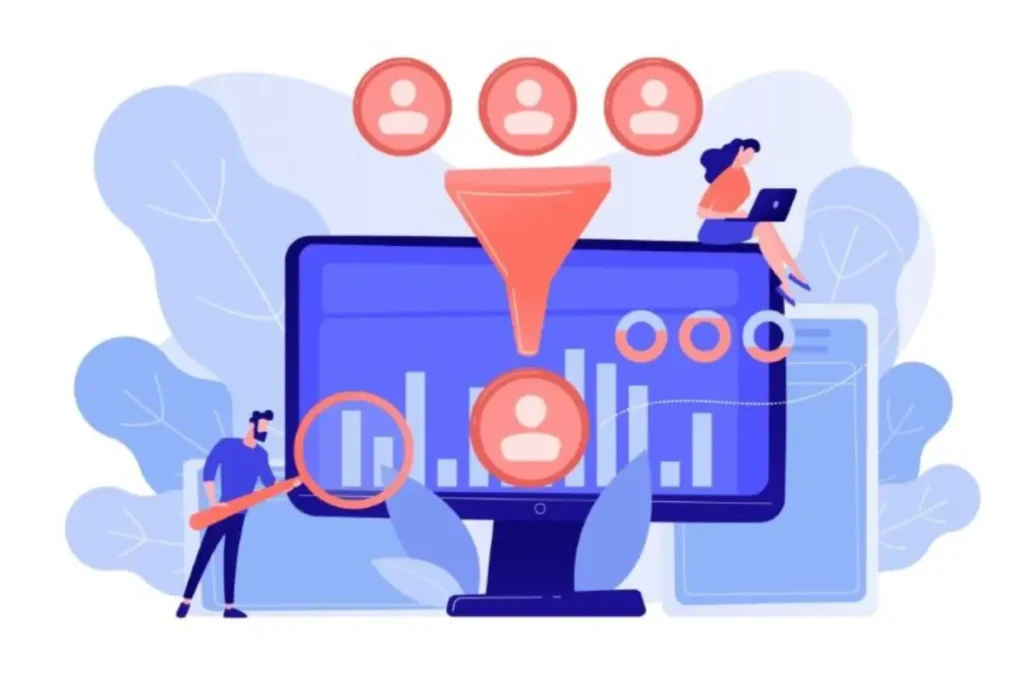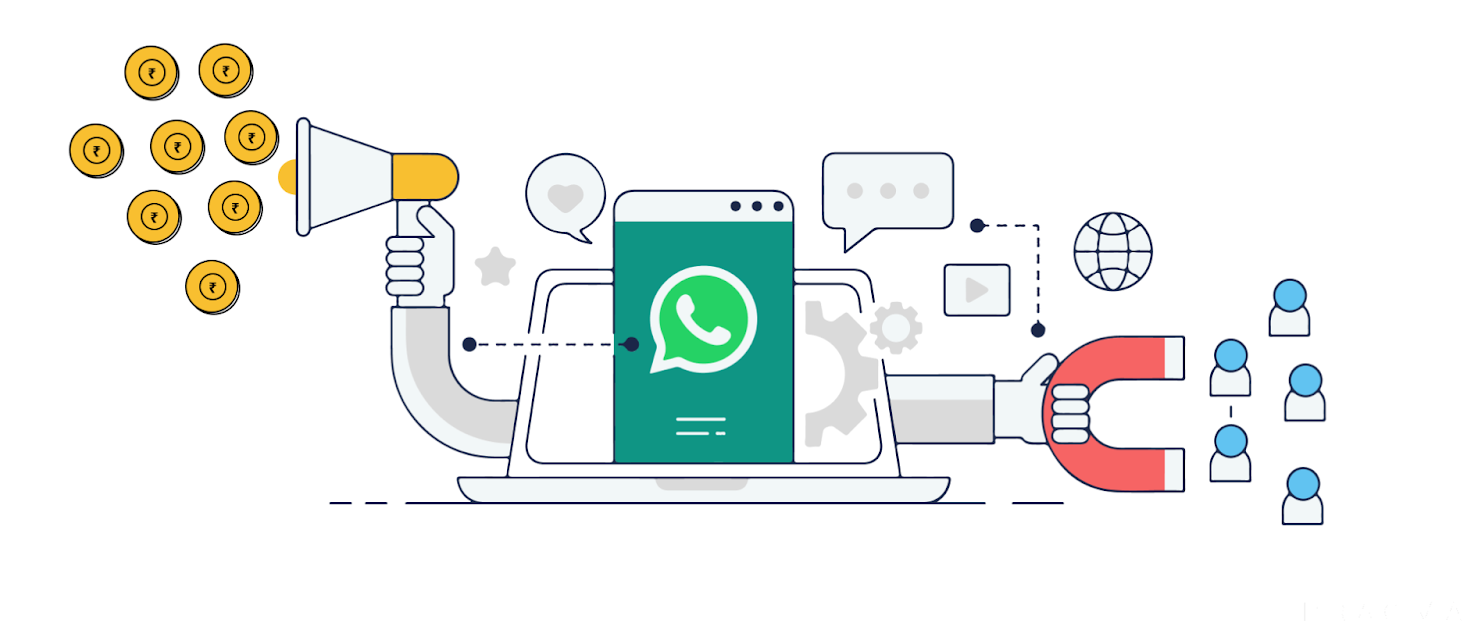The Comprehensive Guide to Generating Organic Leads Using WhatsApp

The article “Ultimate Guide to Growing Organic Leads Using WhatsApp” will provide essential insights into acquiring leads via WhatsApp. Lead generation on WhatsApp involves attracting customer interest and connecting them with the company’s products or services.
WhatsApp can help identify and convert potential customers, even if you are initially unfamiliar with them. Effective lead generation on this platform requires adapting to its unique features, highlighting the brand’s personality, and building strong customer relationships. With its high user engagement rates, WhatsApp is an excellent tool for generating and converting leads.
Understanding WhatsApp Lead Generation

Why Choose WhatsApp?
With numerous platforms available that are considered superior for lead generation, one might wonder why WhatsApp is the optimal choice. The answer lies in WhatsApp’s unparalleled convenience and flexibility.
As a marketer, it’s crucial to utilize channels where your potential customers feel more comfortable. WhatsApp is undoubtedly one of these platforms. Generating leads on WhatsApp involves attracting potential customers who show interest in a product or service through WhatsApp Business.
Businesses can generate leads on WhatsApp via the WhatsApp Business App or WhatsApp API. While this approach may be new for some companies, it offers multiple benefits
6 Advantages of Using WhatsApp for Lead Generation
WhatsApp surpasses traditional methods like email and web chat in addressing common issues faced by businesses employing these channels for lead generation.
Businesses can gather lead information, such as names and phone numbers, when initiating a message via WhatsApp web chat or the WhatsApp app, achieving greater visibility. This platform allows for quicker lead progression through the sales funnel and improved conversion rates by eliminating the need for formal language.
Additionally, WhatsApp’s features like chat links, QR codes, and more enable efficient lead generation. Before delving into these specifics, let’s explore the benefits of using WhatsApp for lead generation:
- Transition from Traditional Methods :Companies are moving away from traditional marketing channels to WhatsApp. Generating leads through WhatsApp is more convenient than email and SMS, offering an interactive messaging platform that bridges the gap between businesses and customers.
- Personalized and Direct Communication:WhatsApp provides direct, individualized communication, allowing for one-on-one conversations with potential customers and creating a personalized experience.
- Immediate Responses :With WhatsApp, businesses can respond instantly to customer inquiries, demonstrating their commitment to customer satisfaction through real-time messaging.
- Sharing Rich Media:Businesses can enhance engagement by sharing photos, videos, product catalogues, and other multimedia elements to effectively showcase their offerings.
- Worldwide Reach:The widespread use of WhatsApp enables businesses to connect with clients globally, overcoming geographical barriers.
- Economical:Using WhatsApp for lead generation has been often more cost-effective than traditional advertising methods, requiring minimal investment.
Is Generating Leads through WhatsApp Worth It?
Leveraging WhatsApp for lead generation offers unique features that help businesses distinguish themselves in a competitive marketplace. Utilizing WhatsApp for business provides several advantages that can elevate your business from modest to substantial growth. One key benefit is the ability to send a single message to over a hundred customers simultaneously.
Among various social media platforms, WhatsApp stands out as the most active messaging service, with connections to over 3 billion users. It is widely used for both personal and professional communication, and users tend to remain loyal to WhatsApp rather than switching to other platforms.
Interestingly, WhatsApp adopted the “Stories” feature from Snapchat and named it “Status.” This move led to a significant number of Snapchat user migrating to WhatsApp, highlighting the platform’s strong user loyalty and devotion.
The core feature of WhatsApp is instant messaging, which ensures seamless communication without the hurdles associated with other conversational marketing strategies. Integrating WhatsApp with AI Chatbots enhances customer service efficiency.
In fact, a report by Morning Consult indicates that 80% of small and medium-sized enterprises (SMEs) are using WhatsApp in conjunction with chatbots to boost leads and sales. By offering tailored WhatsApp solutions, businesses can effortlessly on board potential clients and meet their needs.
Ways to Generate Organic Leads on WhatsApp
Discover different strategies for effectively generating organic leads on WhatsApp.
WhatsApp offers a straightforward approach for generating leads using both free and paid tools like QR codes, click-to-chat features, web chat widgets, and third-party services. This section will guide you through different methods to generate leads on WhatsApp.

- Utilizing WhatsApp Chat Widget for Lead Generation:Implementing a WhatsApp chat widget is an effective method for lead generation. This widget simplifies communication by allowing website visitors to engage with your business with just a click. Whether visitors are browsing products or seeking information, having a WhatsApp chat widget provides a direct channel for communication. Upon initiating a chat, you instantly receive the customer’s phone number for future correspondence.
- Leveraging Social Networks, Particularly Facebook:Integrating social networks into brand marketing, such as Facebook, can significantly boost lead generation. By adding a WhatsApp chat button to your Facebook posts, you enable customers to easily connect with your customer service, facilitating conversions.
- Implementing Click-to-Chat for Lead Generation:Linking your Facebook account to your WhatsApp Business account and creating WhatsApp click-to-chat ads on platforms like Facebook and Instagram can expand your lead reach. It’s important to note that while WhatsApp advertisements incur costs, they can be an effective investment for lead generation efforts.
WhatsApp Lead Acquisition for Sales and Customer Assistance
Here’s how WhatsApp can be effectively utilized for lead generation in sales and customer support:
- Enhancing Sales via WhatsApp:Businesses can leverage WhatsApp to drive sales by showcasing their brand personality, nurturing customer relationships, and providing valuable information tailored to their target audience. This platform offers a straightforward channel for engaging with potential customers, making it easier to convert leads into sales.
- Integrating WhatsApp with Customer Support Channels:In addition to boosting revenue, WhatsApp seamlessly integrates with customer service channels, enabling organizations to deliver prompt and efficient service to their clients. Unlike traditional channels like email and web chat, WhatsApp offers more engaging and immediate communication, addressing common issues encountered by businesses. By collecting lead information such as names and phone numbers, businesses can follow up with potential clients and guide them through the sales funnel. WhatsApp can also be linked to Facebook pages and Instagram accounts, redirecting traffic from these platforms to WhatsApp for increased interaction.
- Implementing Best Practices:Effective management of customer relationships involves setting clear follow-up expectations and balancing informal conversations with automation. With WhatsApp’s 24-hour rule, businesses can directly contact clients within the first 24 hours of initiating a chat. Subsequently, organizations can send promotional messages to WhatsApp users, provided they adhere to WhatsApp’s terms and conditions. By respecting and understanding these guidelines, businesses can leverage WhatsApp for successful lead generation.
Best Practices to Manage WhatsApp Leads
- Quick Response Time:Respond to inquiries promptly to keep potential leads engaged and interested.
- Personalized Messaging:Tailor your messages to address individual customer needs and preferences.
- Use Automation Wisely:Implement chatbots for initial interactions to provide instant responses, but ensure smooth handoffs to human agents when needed.
- Clear Follow-Up Expectations:Set and communicate clear follow-up timelines to manage customer expectations effectively.
- Leverage Rich Media:Use images, videos, and other multimedia elements to make interactions more engaging and informative.
- Maintain Professionalism:Balance informal conversational tones with professional conduct to build trust and credibility.
- Segment Leads:Categorize leads based on their interests and behaviours for more targeted communication.
- Regularly Update CRM:Keep your customer relationship management system updated with the latest lead information to track interactions and follow-ups.
- Adhere to WhatsApp Guidelines:Ensure compliance with WhatsApp’s terms of service, especially regarding promotional messaging and user privacy.
- Monitor and Analyse Performance:Regularly review metrics such as response times, engagement rates, and conversion rates to identify areas for improvement.
- Provide Value in Every Interaction:Aim to offer valuable information or solutions in each conversation to build stronger relationships with potential customers.
